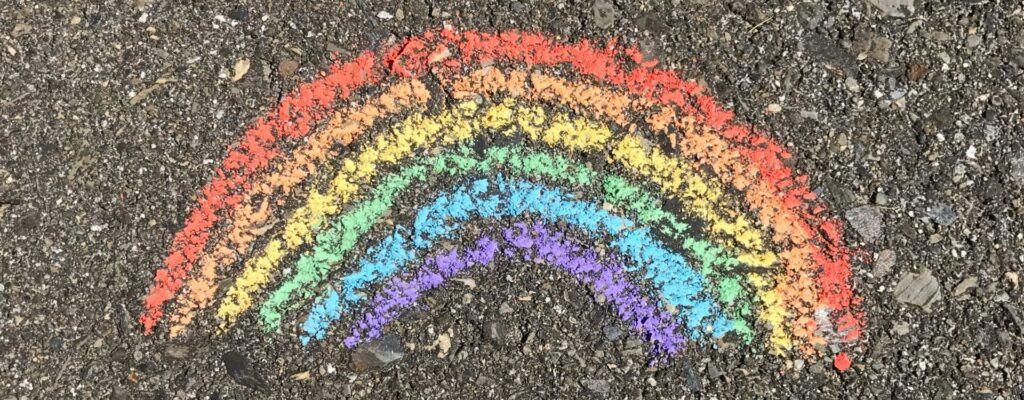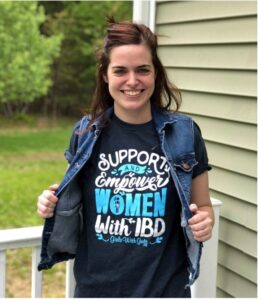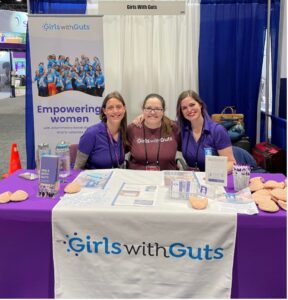Coping | IBD | Ostomy | Relationships

 The start of the New Year can be a time for renewed beginnings and new starts and on this new year, I am asking for a different conversation to be had. One that still navigates our usual, familiar IBD challenges, but also addresses the needs of LGBTA+ people living with IBD. As President of GWG, I’m always talking about different aspects of my health, but this blog is about the most important aspect which is probably talked about the least.
The start of the New Year can be a time for renewed beginnings and new starts and on this new year, I am asking for a different conversation to be had. One that still navigates our usual, familiar IBD challenges, but also addresses the needs of LGBTA+ people living with IBD. As President of GWG, I’m always talking about different aspects of my health, but this blog is about the most important aspect which is probably talked about the least.
When I was diagnosed with IBD in 2004, I had only just briefly begun to navigate my own sexuality. The summer I was diagnosed with ulcerative colitis was right before I was meant to start high school. I ended up starting with a 6-month delay due to complications that resulted in emergency surgery and a hefty rehabilitation period. Not only did I have to navigate a shiny new diagnosis and an ostomy bag at the age of 14, but I was also wading through the confusion about my sexuality on top of that.
I was labeled as the “sick girl” by my peers before I had even started school. News of my late start and the speculation as to why spread around the school like wildfire. Thankfully, and to my surprise, the “label” was mere curiosity, and my class was actually understanding, inquisitive about my disease, helpful, and thoughtful.
Now that I was “out” about my diagnosis, next came the challenge of my identity.
At 17, after toying with the idea that I was bisexual, I came out as a lesbian. I had just finished up with myJ-pouch series and was starting to feel more “me” after having spent ages 14-17 having surgery and recovering on every break I had. My experience in high school was very different to my peers and I often felt like an outsider, navigating things most people around me could never understand.
 I was accidentally outed to my family, who did not take it well initially. It became a “don’t ask, don’t tell” situation almost immediately.
I was accidentally outed to my family, who did not take it well initially. It became a “don’t ask, don’t tell” situation almost immediately.
I had known something was different about me at an early age when liking boy band artists and having crushes on movie characters was not as natural as it seemed to be for my friends. Talking about boys and dating was not as comfortable for me and initially, I thought it was because of my discomfort in my body and the anxieties that come with revealing a chronic illness to a partner. However, I soon realized that it was much more than that – in fact, it was a combination of accepting my sexuality as well as my diagnosis and how those could impact each other.
Throughout my IBD journey, I have also had many complications with RV fistulae and, due to the recurrent nature and surgical complications as well as a re-diagnosis of Crohn’s disease when I was 22, I now live with a permanent ostomy.
Now that I have had time to look back on my diagnosis and its impact on my sexuality, it has dawned on me that I came out not only once, but twice and continue to have to do so now. I have to come out regularly about my diagnosis and sexuality (if it is a safe place to do so) to colleagues or new friends to ensure that the environment is best suited for my multiple disabilities and is somewhere I can express myself freely.
I have to come out about my sexuality to doctors to ensure that my care team can best help and support me. Sometimes the conversation is extremely fluid and other times it still feels like I am juggling the weight of two very heavy and different labels, because of the unfortunate stigma that still exists in our society. The challenges are no doubt much greater for other community members.
In spite of the discomfort, I come out regularly, because I am committed to working to shift the conversation surrounding sexuality and identity in the chronic illness community. It is extremely important that our voices are heard and acknowledged to change the future of healthcare.

Based on my experience and conversations, here are a few challenges experienced by LGBTA+ people living with IBD:
1. Truly queer-informed and fully inclusive clinics can be rare, and many community members rely on online sources of health information or other LGBTA+ members for IBD-related concerns. Patients may delay seeking IBD care due to worry about judgment and may be reluctant to discuss sexual orientation and gender identity with their care team.
2. It is often down to the person with IBD to initiate conversations around sexual health and the impact of treatment (the only time it has come up for me is in relation to pregnancy and child-rearing, as opposed to sexual function, libido, etc). There is a need to raise awareness around immunosuppressive medicines and how it may increase the risk of sexually transmitted infections (STIs).
3. The impact of surgery on sexual function rarely comes up. This is particularly important for community members who engage in anal sex. There is minimal discussion around:
4. I can’t talk to the experiences of people in other countries, but in my opinion, there are unacceptable differences in treatment, resources and information depending on where you live, and this is especially so for LGBTA+ IBD patients living in US without anti-discrimination protections.

The biggest challenge for me, personally, can be coming out more than once because my sexuality has not been noted correctly, especially when it is relevant to my care. These types of interactions discourage the open dialogue and trust one needs with a healthcare team. As an example, at a recent consultation, I was asked if there was a chance of accidental pregnancy, even though I had been clear previously and it is noted in my chart that as a lesbian woman this was not possible.
Everyone has a different level of acceptance of the LGBTA+ community, both inwardly and outwardly, and while I would always encourage, empower and support patients to try and have these conversations with their medical team to ensure they can receive proper treatment, the burden is often on the patient to seek out an inclusive environment, rather than a warm, safe, welcoming space being made routinely available.
One of my first interactions with my own GI doctor (and one of the reasons I am the patient advocate I am) was that upon finding out I was queer; he had all the restroom signs in the practice changed to gender-neutral and made sure to share that with me. I felt so supported and cared about. He would also make a point to ask about my previous girlfriend at each visit.

I am aware that my experiences as a queer person living and accessing IBD care in Philadelphia, Pennsylvania, unfortunately, may be dramatically different from those of some of my fellow LGBTA+ IBD patients, but I hope that by sharing even a snippet of my story and continuing to be open and honest about who I am, we will have more individuals with various identities under the LGBTA+ umbrella who feel safe and empowered to share their own experiences. I think it all starts with a conversation. And that conversation can start a ripple effect.

As a patient advocate, I know how important it is to speak up, especially when it is uncomfortable- so in some instance I have advocated for a new doctor. I have learned from these interactions that you CAN and WILL find the right fit for you, but sometimes it takes a few tries. You do not have to accept care if you are made to feel like your sexuality isn’ t important in the grand scheme of your healthcare.
My hope is that by continued conversation, the barriers within our community can be illuminated so that significant changes can be made. As a queer patient, you deserve well-rounded care and you do not need to settle! Be as honest as you possibly can about your experience, so you can find someone who will treat you with all the tools in their belt. And if you can’t find an appropriate person, let Girls With Guts help you find a health professional who is LGBTA+-informed.
Editors note: This blog was written as part of a sponsorship by Pfizer. Sponsor support along with donations helps to maintain our website and the free resources and programs of Girls With Guts, a 501(c)(3) nonprofit organization.
